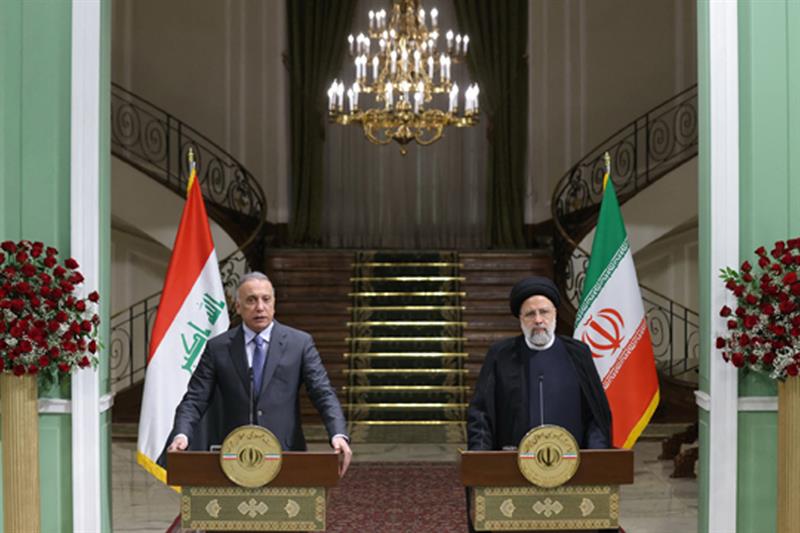
Raisi (r) in a joint press conference with Al-Kadhemi in Tehran (photo: AFP)
In the framework of “boosting security and stability in the region”, Iraqi Prime Minister Mustafa Al-Kadhimi visited Saudi Arabia and Iran this week. He first met Saudi Crown Prince Mohamed bin Salman in Jeddah, then he left for Tehran to meet Iranian President Ebrahim Raisi. In a press conference following the latter meeting Raisi said: “Dialogue with regional officials can resolve the regional issues.”
But Iranian Foreign Ministry Spokesperson Saeed Khatibzadeh told a news conference in the Iranian capital that “Saudi Arabia wants to resume diplomatic talks with Tehran.” The Iranian spokesman added that “we heard the Saudi side is ready to raise the level of representation in the talks, and a new round of dialogue will be decided soon”. He hinted that “technical” teams from the two countries will exchange visits, probably in preparation for reopening embassies in each other’s capitals. Diplomatic ties between Saudi Arabia and Iran were severed in 2016 after an attack on the Saudi diplomatic mission in Tehran.
The two countries have been engaged in low-level talks in Baghdad and Muscat since early last year. The fifth round of talks between the two parties was in April. Since then, Israel upped its clandestine attacks within Iran and became more vocal in its opposition to the Vienna talks to revive the 2015 Iran nuclear deal, or Joint Comprehensive Plan of Action (JCPOA). Former American president Donald Trump withdrew from the JCPOA in 2018, but President Joe Biden’s administration started indirect talks to rejoin it last year.
As the region prepares for a summit in Jeddah next month, to be attended by Biden on his first visit to Saudi Arabia as a US president, diplomacy has been very active on many fronts. The summit will include the Gulf Cooperation Council (GCC) leaders, plus leaders of Egypt, Jordan and Iraq. There have been leaks and Israeli hype about a possible American-sponsored military cooperation between Israel and Arab countries to counter Iran.
Iraq is in an awkward position domestically, and the feeling is that such developments may make the situation worse. Political chaos in Iraq leaves Al- Kadhimi little choice to save his untenable premiership. But it seems that Saudi efforts to balance Iranian influence in Iraq are working. As one non-partisan political analyst in Baghdad told Al-Ahram Weekly, “we’re fed up of turning our country into another ‘Lebanon’ in the region, where regional powers settle their struggles. The Gulf, Iran, Israel and Turkey are all actively involved in our country. We even have a ‘Hizbullah’ of our own.”
Still, many doubt that Al-Kadhimi has enough political clout to mediate between Riyadh and Tehran. One London-based Iraqi commentator described the PM’s mission as “one of a messenger”: “He is just carrying messages between the two adversaries in the hope that it will be added to his legacy as the Iraqi politician who helped them to resume their dialogue”, he told Al-Ahram Weekly.
Both sides are actually keen to resume talks towards improving relations for different reasons. According to many commentators, the Saudis want to sort out the conflict in Yemen for good. Iran has an influence on the Yemeni Houthi rebels that can help end the military conflict there. According to the London-based commentator, Riyadh would rather have this resolved regionally than through a bargain with the Americans.
There are other hot spots where Iranian-backed militias are of concern to Saudi Arabia and the GCC countries in general. Lebanon in particular is a major arena for proxy conflict. As for other areas of friction, “in Syria, Iran is no longer a major player, they handed it all to the Russians. In Iraq, Iranian influence is waning with factions allied to Tehran turning against each other,” the latter commentator said.
Iran also needs to ease tensions with its neighbours, not only to eliminate pretexts for Israeli aggression and avoid a hardened American position in JCPOA talks, but for internal reasons as well. The economic situation in Iran is deteriorating rapidly. A current global downturn is impacting the sanction-strangled country more than any other, and sporadic demonstrations in Iranian cities, protesting the rocketing cost of living, could easily turn into wider instability threatening the regime. Some analysts are talking about a possible popular uprising no less significant than what happened in 1979 and led to the toppling of the Shah regime and the rise of Ayatollah rule.
Internal factors in Iran are very significant in pushing the government to change positions, both on its nuclear deal talks with the Americans and world powers, and on dialogue with its Gulf neighbours, especially Saudi Arabia.
There is a mood of détente in the region, and Tehran can capitalise on that. But it needs to be ready to compromise, and probably “offer some concessions”, as one Iranian political analyst in the UK told the Weekly. It is not clear yet if Tehran is, and the Saudis are in no rush to offer the Iranians a free favour by opening embassies without a commitment to stop supporting militias in the region.
That detente in the region is also why the Iranians want to move the JCPOA talks from Vienna to the Qatari capital Doha. They hope Qatar can play the same role it played in negotiations between the Americans and Afghan Taliban that led to America and the West fully disengaging with Kabul. Yet the aforementioned analyst said the analogy is not valid, and Tehran might find it difficult to rely on Qatari support in negotiations with the Americans.
A version of this article appears in print in the 30 June, 2022 edition of Al-Ahram Weekly.
Short link: